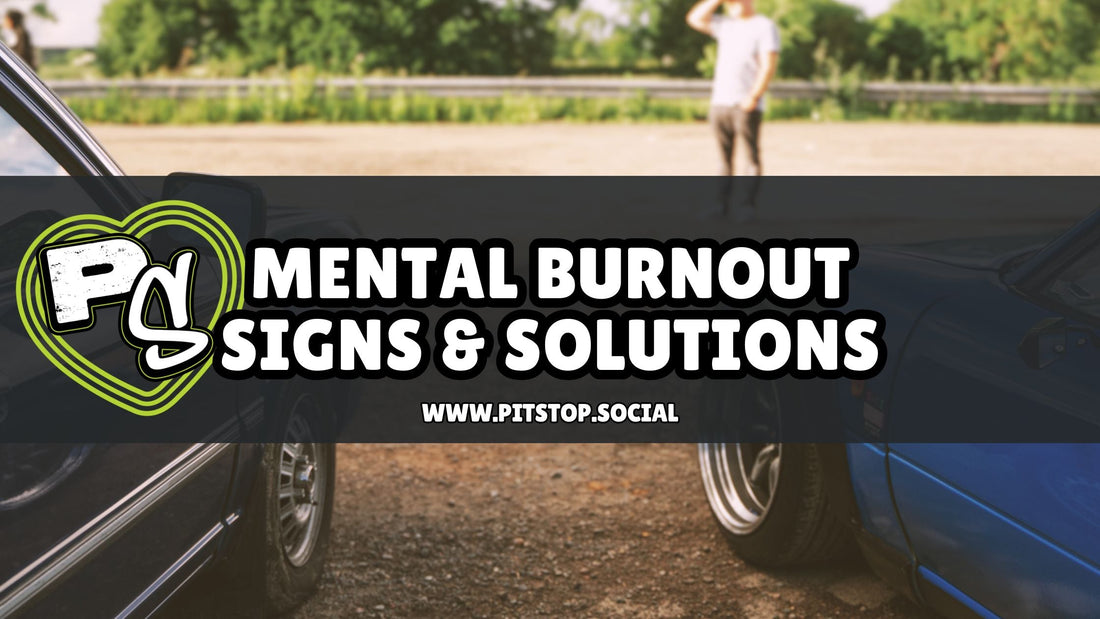
Burnout, Breakdown, and the Road to Recovery
Share
Burnout isn’t a buzzword. It’s a full-body, emotional, and mental crash that too many of us are quietly enduring - especially in high-octane, high-pressure environments like the automotive community.
From the outside, it can look like you’re holding it together: turning up to meets, hitting deadlines, spannering through the night. But inside? You’re stuck in neutral, running on fumes, wondering why you feel flat when your passion used to ignite everything.
The truth? You’re not broken. You’re overwhelmed. And like any well-loved engine, you deserve the care it takes to cool down, reset, and refuel.
Let’s unpack what burnout really is, how to recognise the signs early, and what you can do to get back on track...
What Is Burnout?
Burnout is a state of chronic physical and emotional exhaustion caused by prolonged stress, overworking, or consistent emotional strain. It's recognised by the World Health Organization as an "occupational phenomenon," but it isn't limited to your job. It can creep into passions, relationships, caregiving, and even your hobbies.
Burnout happens when your internal load is heavier than your ability to carry it. You can’t keep adding weight without giving yourself time to unload. This imbalance pushes your nervous system into a constant fight-or-flight state, eventually leading to complete physical and emotional shutdown.
Scientifically speaking: Chronic stress increases cortisol and adrenaline levels, putting your body in survival mode. Over time, this impairs memory, focus, digestion, immunity, and mood regulation. Long-term burnout can lead to anxiety, depression, and even heart issues.
Signs You’re Running on Empty
Burnout doesn’t always look dramatic. Sometimes, it’s subtle. A drop in performance. Losing your spark. Feeling tired all the time. Avoiding things you used to love - like driving, detailing, or catching up with your car club.
Here are some red flags to keep in mind:
⚠️ Constant exhaustion, even with rest
⚠️ Struggling to focus or complete simple tasks
⚠️ A short fuse, emotional, or snapping over small things
⚠️ Aches, headaches, digestive problems
⚠️ Feeling numb, detached, or unmotivated
⚠️ Dreading social events or meetups you once loved
⚠️ Loss of joy in your passions, including cars or builds
⚠️ Feeling like you’re just surviving the day, every day
If you’re nodding along, don’t ignore it. These signs are your check engine light - it’s time to pull over and check things out.
Why Burnout Isn’t Your Fault
We live in a hustle culture that glamorises being “booked and busy.” But constant output without input isn’t strength - it’s depletion.
Whether you’re holding down a full-time job, supporting a family, building your dream project car, running a brand, getting your life on track (or all of the above) - there’s only so much fuel in the tank. And refuelling isn’t weakness. It’s wisdom.
Burnout isn’t a personal failure. It’s a normal human response to an unmanageable environment. Often, it hits the most driven, dedicated people - the ones who care the most.
How to Start Healing from Burnout
Burnout recovery isn’t about quitting everything. It’s about realigning your life so you can keep going without losing yourself in the process. Here’s how to begin.
1. Pause and Acknowledge
Let yourself admit it. “I think I’m burned out.” You don’t need to justify it. Naming it allows you to start supporting yourself rather than pushing through it.
💬 Try saying:
💚 “I’m doing my best, but I’m at capacity.”
💚 “I need time to reset before I break down.”
💚 “My value isn’t in how much I produce.”
Think of it like pulling into a PITSTOP: a moment to recalibrate, to reset, not retreat.
2. Rest With Intention
Sleep helps, but true recovery takes deeper rest. Your nervous system needs space to shift out of overdrive.
🚗 Try:
💚 Sensory rest: reduce screens, loud noises, even the hum of constant chatter.
💚 Mental rest: jot down your thoughts, avoid multi-tasking, create quiet moments.
💚 Social rest: take a break from being “on” for everyone - especially if you’re masking how you feel.
💚 Creative rest: don’t force yourself to build, design, or solve when you’re drained. Inspiration returns when pressure lifts.
Even your car needs time off the road. So do you.
3. Offload Mental Load
Your brain has a limit. Carrying every task, deadline, worry and emotional weight in your head can lead to decision fatigue and overwhelm, and a whole bunch of other negative side effects...
🛠️ Try:
💚 A brain dump every morning or night
💚 Using to-do lists that prioritise just 1-3 things
💚 Asking: “What’s actually urgent today?”
💚 Automating or scheduling simple things like meals, reminders, or self-care blocks
💚 Ask someone you trust to help with some of your load
Think of it as clearing your boot space - make things lighter and you’ll move more freely.
4. Reconnect (Even Quietly)
Burnout often leads to isolation, but we’re wired for connection. So it's a good job that connection doesn’t always mean conversation.
🫂 Try:
💚 Sitting in calm company
💚 Listening to someone else share (without needing to talk back)
💚 Reaching out to a mate just to say, “thinking of you”
💚 Getting to a car meet - even if you don’t talk, just being there can help regulate your system
Human nervous systems co-regulate. You don’t have to fix it alone.
5. Rebuild Gently
Don’t rush to get “back to normal.” That version of you was burning out.
Instead, ask yourself:
💚 What can I let go of?
💚 Where can I say no?
💚 What feels nourishing instead of depleting?
This is your rebuild phase. Swap burnout culture for balance. Swap autopilot for alignment. Treat yourself like you’d treat your most prized build: with patience, respect, and regular tune-ups.
UK-Based Support Resources
If you’re struggling with burnout or feel overwhelmed, these UK resources offer guidance, support, and someone to talk to:
SHOUT (text "SHOUT" to 85258) – Free, 24/7 crisis text line for mental health support
Mind UK – Burnout, anxiety, and stress resources: mind.org.uk
Hub of Hope – Find local mental health services and peer support: hubofhope.co.uk
NHS Every Mind Matters – Build a personal mental wellbeing action plan: nhs.uk/every-mind-matters
CALM (Campaign Against Living Miserably) – Support for men and anyone in crisis: thecalmzone.net
Occupational Health (if you're in employment) – Confidential help, therapy, and burnout prevention tools through your workplace
Final Words from PITSTOP.Social
You can’t drive on empty. And you shouldn’t have to.
Your rest is not a luxury - it’s maintenance. Your need for support is not weakness - it’s wisdom. And your burnout? It’s not who you are. It’s a signal that something needs to change.
We built PITSTOP.Social around spaces to pause, recalibrate, and drive forward with more care and community. You don’t need to talk if you’re not ready. But when you are? We’re here.
Positive
Independent
Temporary
Spaces
Together
Openly
Progressing
Your journey is still valid, even if you’re in the slow lane at times.
Join the Conversation!
Share your stories, struggles and support
Join the Community
#DONOTOVERINFLATE #FUELUP #BURNOUTSARENTCOOL
